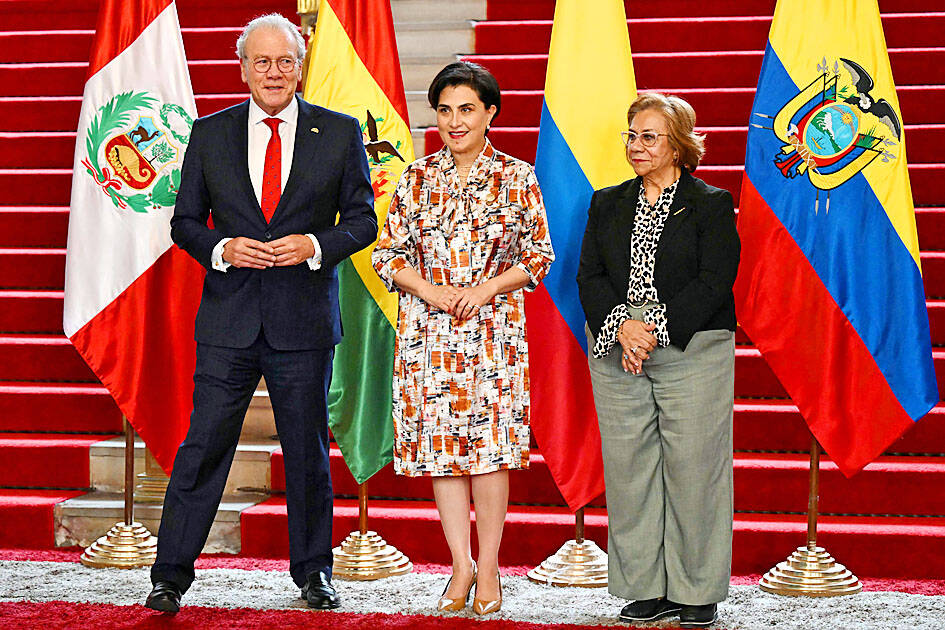A South American trade bloc on Monday ruled that Peru is failing to meet its commitments to curb illegal gold mining and mercury trafficking, siding with indigenous groups who say their Amazon rivers and food supply are being poisoned.
The decision by the Andean Community — which includes Peru, Colombia, Ecuador and Bolivia — orders Peru to urgently reform its laws, seize machinery that sucks up river sediment and other mining equipment, and end extensions of a registry for informal miners that critics say shields illegality.
It is the first time the Andean Community has taken up a case of this kind and formally ruled against a member country as authorities try to find mechanisms to crack down on the growing trade.

Photo: AFP
Illegal gold mining has spread widely across the Amazon, as global demand and soaring gold prices make the trade increasingly lucrative. Analysts expect gold would see gains toward US$4,000 per ounce by next year.
Mercury is widely used to separate gold from sediment, but it contaminates waterways, accumulates in fish and builds up in human bodies — posing particular risks to children and pregnant women.
Peru has 20 working days to comply and report what steps it has taken or plans to take to bring its laws into line. If it fails, the case could be referred to the bloc’s Tribunal of Justice, which has the power to impose binding trade sanctions on member states.
The complaint was filed at the end of June by a coalition of indigenous and rural communities from the Nanay River basin, who say mercury from illegal gold mining is poisoning fish and rivers in Peru’s northern Amazon. Hair samples collected in the area have shown mercury levels far above WHO safety limits, and researchers have linked exposure to rashes, stomach illness and neurological damage.
“In some way it is a response to the demands of communities affected by mercury contamination, and it is also a message for other countries that they must make the effort to comply and to respect everyone’s right to live in a healthy and adequate environment,” Peruvian environmental lawyer Cesar Ipenza said.
Ipenza said that if the country fails to comply, the sanctions would be economic, such as tariffs on Peruvian products within the four Andean nations.
The decision could also set precedent and lead to rulings against other countries, he said.
Peru has launched occasional crackdowns on illegal mercury, including the 2019 “Operation Mercury” raid in the Madre de Dios region in the Peruvian Amazon and a record seizure of contraband mercury earlier this year at the port of Callao.
However, indigenous groups say enforcement remains patchy and corrupt networks allow the trade to flourish.
The Associated Press did not receive a response for a request to comment from either Peru’s Ministry of Foreign Trade and Tourism or Ministry of Culture, the government office that oversees indigenous affairs.
“It is a warning to the countries that are destinations for the gold. They must have greater clarity about its origin,” Ipenza said.
They need due diligence mechanisms beyond just paperwork, to prevent trading in gold that comes from the destruction of the Amazon, from contamination and from the violation of fundamental human rights, he said.

Indonesia and Malaysia have become the first countries to block Grok, the artificial intelligence (AI) chatbot developed by Elon Musk’s xAI, after authorities said it was being misused to generate sexually explicit and nonconsensual images. The moves reflect growing global concern over generative AI tools that can produce realistic images, sound and text, while existing safeguards fail to prevent their abuse. The Grok chatbot, which is accessed through Musk’s social media platform X, has been criticized for generating manipulated images, including depictions of women in bikinis or sexually explicit poses, as well as images involving children. Regulators in the two Southeast Asian

COMMUNIST ALIGNMENT: To Lam wants to combine party chief and state presidency roles, with the decision resting on the election of 200 new party delegates next week Communist Party of Vietnam General Secretary To Lam is seeking to combine his party role with the state presidency, officials said, in a move that would align Vietnam’s political structure more closely to China’s, where President Xi Jinping (習近平) heads the party and state. Next week about 1,600 delegates are to gather in Hanoi to commence a week-long communist party congress, held every five years to select new leaders and set policy goals for the single-party state. Lam, 68, bade for both top positions at a party meeting last month, seeking initial party approval ahead of the congress, three people briefed by

Yemen’s separatist leader has vowed to keep working for an independent state in the country’s south, in his first social media post since he disappeared earlier this month after his group briefly seized swathes of territory. Aidarous al-Zubaidi’s United Arab Emirates (UAE)-backed Southern Transitional Council (STC) forces last month captured two Yemeni provinces in an offensive that was rolled back by Saudi strikes and Riyadh’s allied forces on the ground. Al-Zubaidi then disappeared after he failed to board a flight to Riyadh for talks earlier this month, with Saudi Arabia accusing him of fleeing to Abu Dhabi, while supporters insisted he was

The Chinese Embassy in Manila yesterday said it has filed a diplomatic protest against a Philippine Coast Guard spokesman over a social media post that included cartoonish images of Chinese President Xi Jinping (習近平). Philippine Coast Guard spokesman Jay Tarriela and an embassy official had been trading barbs since last week over issues concerning the disputed South China Sea. The crucial waterway, which Beijing claims historic rights to despite an international ruling that its assertion has no legal basis, has been the site of repeated clashes between Chinese and Philippine vessels. Tarriela’s Facebook post on Wednesday included a photo of him giving a